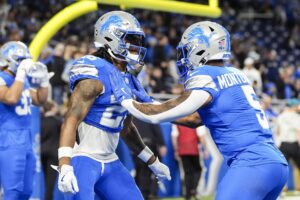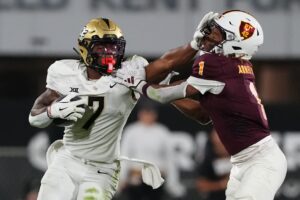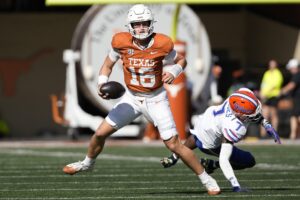The Baltimore Ravens entered the 2020 free agency period coming off of one of their most successful seasons in franchise history. John Harbaugh‘s squad set a franchise-record with 14 regular-season wins and set the all-time single-season rushing record as a team. They were also in the rare position of being able to retain almost all of their important players. This meant that general manager Eric DeCosta didn’t need to make a splash if he didn’t want to.
However, instead of standing on his already talented roster, DeCosta got very creative in addressing some of the team’s needs.
The Ravens’ biggest problem in 2020 was getting consistent pressure against the pass. Baltimore finished the season with just 37.0 sacks as a team — 21st in the NFL. This was on the heels of a complete remake on the edge during the 2019 season. Many speculated the Ravens could be in pursuit of a big name pass rusher like Jadeveon Clowney or Yannick Ngakoue. Instead, Decosta went a non-traditional route. The Ravens added one of the league’s best interior pass rushers in Calais Campbell via trade and retained (for now) the team’s best pass rusher in Matt Judon on the franchise tag. He also made a number of moves to collect draft capital for the upcoming NFL draft.
Having success during the upcoming season can be directly traced back to free agency and DeCosta has started 2020 in a great way.
Ravens 2020 Free Agency Grades: Signings and Trades
Matt Judon: Receives 2020 franchise tag
While finding more pass rushers was a big priority for the Ravens in 2020, they haven’t signed any new ones on the edge. Judon was always a likely candidate to receive the franchise tag coming off the best season of his career but it looks like he will actually be staying in Baltimore for the upcoming season. It was widely speculated that the Ravens would try and shop Judon while he was still under club control. Instead, DeCosta has made a number of other trades to try and accumulate draft capital to use on players coming out of college.
By retaining Judon (for now), the Ravens have a safe option off of the edge. They are currently flying very close to the cap ceiling with Judon’s tagged-cap hit at $15.828 million and thus have little room to find an upgrade. Finding a long-term option that will play for cheaper than Judon – who had 9.5 sacks and 33 quarterback hits in 2019 – would be incredibly unlikely. There is also still the possibility of the Ravens trading Judon or him netting them a compensatory pick if he were to walk in free agency in 2021.
Unless Judon is dealt for another pass rusher with a cap hit lower than his, it looks like the Ravens will retain their leading sack man from 2019 for another season. It’s not the sexiest option but if he improves his production even further, Judon should have a large impact on the Ravens pass rush again in 2020.
Grade: B+
Calais Campbell: Traded to Baltimore for a fifth-round pick (157th overall) in 2020
The Ravens’ first big acquisition this off-season has been their most significant. With the Jacksonville Jaguars looking to be in a bit of a teardown, Campbell – the reigning Walter Peyton Man of the Year – found himself shipped to Baltimore for a very modest price.
The Mountain of a man enters his first season in Baltimore coming off of a 6.5 sack and 25 quarterback hit season. He was also Pro Football Focus’s run defender of the year, finishing 2019 with a 90.8 run defense grade, to go along with his 90.3 overall grade. Campbell has been one of the league’s best disrupters up the middle over his 12 years in the NFL and brings a needed pass rush element to the Ravens defensive line. Baltimore has always been able to find good run defenders but getting to the quarterback on the interior has been more of a struggle.
Another added benefit of trading for Campbell is that his extension will not count against the compensatory pick formula. He was extended following his acquisition from Jacksonville for two years at $25 million. His average annual value of $12.5 million could have been used to address the pass rush in free agency but instead, the Ravens can potentially grab a fourth-round compensatory pick if one of their current unrestricted free agents cashes in on the open market.
The Campbell trade is one of the lowest-risk moves the Ravens have made for a star player in free agency. There is almost no downside to this deal and Campbell fills a huge need for the Ravens.
Grade: A+
Hayden Hurst: Traded from Baltimore along with a fourth-round pick (143rd overall) in 2020 to Atlanta for a second-round pick (55th overall) and a fifth-round pick (158th overall) in 2020
Trading Hurst to the Falcons is tricky to evaluate. The Ravens currently have two other starter-quality tight ends on the roster but the rotation of Hurst, Mark Andrews, and Nick Boyle was one of the biggest reasons Lamar Jackson had so much success over the middle. Getting a second-round pick back for Hurst is ok but trading back 15 spots from 143rd to 158th overall is perhaps a little much to give up. Hurst has one of the best contracts of any 26-year-old in the NFL and tight end was a pressing need for the Falcons after losing Austin Hooper.
Now entering the draft, the Ravens have to address the third tight end spot on the roster by either drafting a young tight end in a very weak class or pick up a veteran. Neither of which will likely effectively fill Hurst’s role. However, the Ravens do still have seven picks in the first four rounds of the draft to work with. DeCosta did not lose the trade but losing Hurst creates a surprisingly large hole in the Ravens offense.
Grade: B-
Michael Brockers: Signed to a three-year(s)/$30 million contract
The Ravens biggest UFA signing in 2020 was Brockers. The long-time Los Angeles Ram signed in Baltimore to effectively replace Michael Pierce but came at a slightly higher cost. Pierce signed a three-year(s)/$ 27 million contract with the Minnesota Vikings but is coming off a less productive season. Brockers is two years older than Pierce. The Ravens interior offensive line also looks a lot bigger after adding Brockers and Campbell. Brockers comes in a 6’5″ while Campbell at 6″8 — Pierce was just 6’0″.
Brockers will now come into Baltimore and form one of the best defensive interiors in all of football along with Campbell and Brandon Williams. He’s a veteran piece that has shown a great ability to stop the run as well as add a bit of quarterback pressure on the side. Pierce was never a great pass rusher and Brockers is coming off of a higher PFF graded season. Brockers has 8.5 sacks and 21 quarterback hits over the past three seasons.
Grade: B+
Chris Wormley: Traded along with a seventh-round pick in 2021 to Pittsburgh for a fifth-round pick in 2021
It was going to be hard for Wormley to find reps on a stacked Baltimore defensive line and he would inevitably hit the open in 2021. Therefore, it made sense for DeCosta to move him now, instead of waiting for him to fall behind on the depth and lose playing time. This would’ve hurt his value on the open market and given him a smaller chance of netting a compensatory pick following next season.
Wormley started seven games and 46% of defensive snaps for the Ravens and was probably their best interior pass rusher. He finished the 2019 season with career-highs in tackles (33), sacks (1.5) and quarterback hits (six). Moving Wormley to a division rival is a bit of a risk, especially one that develops quality defensive tackles like the Pittsburgh Steelers, but getting a significant upgrade in the draft next season is good value.
Grade: B+
Jimmy Smith: Resigns in Baltimore to a one-year(s)/$6 million contract
Retaining Smith is a huge win for the Ravens. The secondary was their strongest position group when relatively healthy in 2019 and getting its longest-tenured member back is huge for both growth and depth. Coach Harbaugh had already made it known he wanted to retain Smith prior to the free agency period and once again, has four quality corners to work with in his secondary.
Smith also remains with the Ravens on a good contract. His cap hit will also be just $3.5 million and gives the Ravens just a little bit extra needed cap space. Smith was injured Week 1 against the Miami Dolphins last season and the secondary looked lost without him. When he returned Week 9 against the New England Patriots, the Ravens defense changed. From being ranked 19th in total defense, and 29th in passing defense prior to their bye, Week 8, to being ranked second in total defense and first in pass defense from Week 9 on.
Bringing back Smith under his perceived market price is a huge win for the Ravens.
Grade: A
Final Free Agency Team Grade: A-
In his second year, DeCosta is once again showing why he is already one of the best executives in all of football. He did not break the bank on any player and filled multiple needs while retaining needed veterans. The Ravens are also stockpiling draft capital for this year’s and next year’s draft. Having this kind of draft capital opens up what the Ravens can do on draft night as well as give them resources to potentially move for in-season upgrades. DeCosta still has a big mission to complete in the draft but has already put his team in a great position to compete for a Super Bowl in 2020.
Main photo:
Embed from Getty Images






